Gentlemen in Germany - a Brunswick AAR
- Thread starter Malurous
- Start date
-
We have updated our Community Code of Conduct. Please read through the new rules for the forum that are an integral part of Paradox Interactive’s User Agreement.
You are using an out of date browser. It may not display this or other websites correctly.
You should upgrade or use an alternative browser.
You should upgrade or use an alternative browser.
Yes, it's amazing how often intense drilling results in pregnancy. HIYO!
I fell out of my chair laughing when I saw this.
Yes, it's amazing how often intense drilling results in pregnancy. HIYO!
This. I just couldn't resist, the heir came right after the Idea so the joke basically forced itself into the update.
Cracking update, and a smashing AAR in general - it's good to see someone making something of the tiny countries I'm always too scared to play.
Thanks!
A wise move on Erich's part to adopt Military Drill as a national idea, it should prove rather handy, especially with Bavaria now as an ally. As for the decadence, it seems as if a war is required to get the lazy curs fit once more and allow for Brunswick's militarily drilled army to be employed.
Military Drill really was a no-brainer here. I can't compete with numbers, so I have to do what I can to make the army good in other ways. I'm looking forward to any opportunity that requires using the army.
Alliance with Bavaria is good. Bad news for the expansionist and vulgar Brandenburgers. I want to see that well drilled army in action. I hope the Bavarians aren't thinking about fighting the Austrians.
Most importantly, the alliance with Bavaria protects me from Bavaria.
It was impressive how fast you pulled to free trade.
73 years for eight levels. I went free trade with every slider move and had a helpful event as well.
A Bavarian entente could quickly turn sour...unlike Brunswick's trading prowess
Correct analysis on both counts.
I fell out of my chair laughing when I saw this.
It's the time
For what?
Is that Hungry Hungary in Friuli? Its shape must be ugly...
Yes they are. And it isn't pretty... I'll include a picture in the update after the next one (as I already made the pics for the next update).
1463-1470: Crafty Councilmen
The inhabitants of Thüringen were not happy with their Bavarian conquerors. However, they weren't seeking a free Thuringia, having seen its vulnerability, but yearned for Brunswick rule. An official petition was made in March 1463.
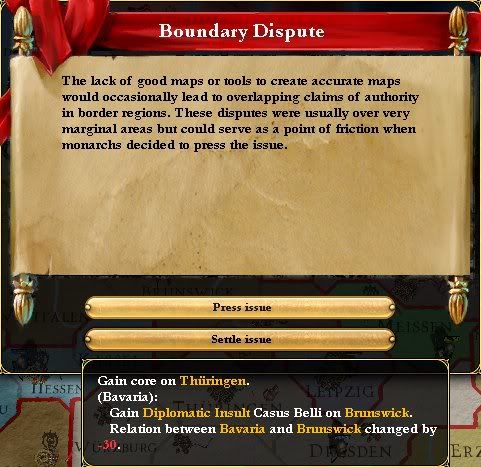
King Erich pestered his powerful ally about the matter, but to no avail. There was little more the King could do about it without angering his (likely temporary) friend.
With the south not being fruitful, Erich turned his attention to the north. Until now less efficient than more traditional Brunswick lands, Bremen and Osnabrück saw land reforms in the autumn.
But only expanding the agriculture and forestry reforms of his predecessors didn't satisfy the King. He also wanted to reform the way goods were manufactured. Until now most of the world had relied on individual artisans more than anything, but by July 1465 Erich and Brunswicker scientists had devised a plan to organize larger, more efficient workshops.

Over the next couple of years, some of the proceeds were used to support merchants in the distant Turkish provinces of Thrace and Bursa as well as France, allowing a presence in Paris and Hainaut in addition to Languedoc.
Alarmed by their neigbor's growing trade, Brandenburg reacted and banned Brunswicker merchants from their capital as soon as the French trade operations began in early 1466.
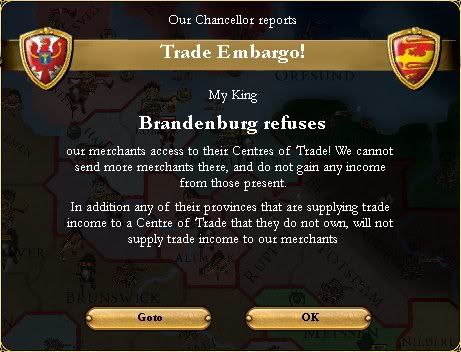
This would further strain the relations between the two nations.
The next year featured more barbs flying. The hated Frisian King sent an insulting message in September, while the Hansa threw out several Brunswick merchants in March 1467. They didn't resort to any bans however.
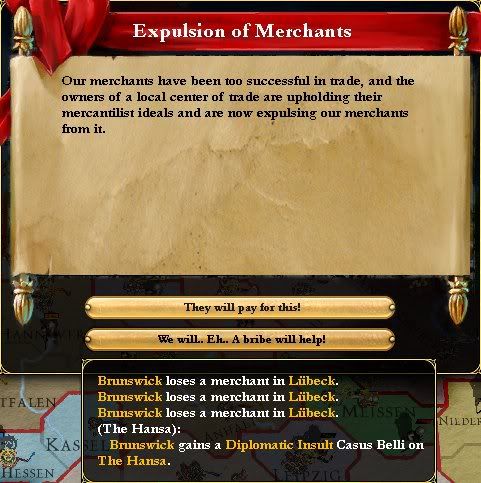
Erich I found the situation threatening: three different neighbors had shown their hostility in only a year's time. Fearing a conflict, he made sure that another four thousand soldiers were recruited to push the Brunswick army up to 20000 men, while testing for better military techniques began.
The King did not see the results of this, however, as he died on September 18th after a nineteen year reign.
Erich's son Heinrich was thirteen, so a regency council was organized for the short term.
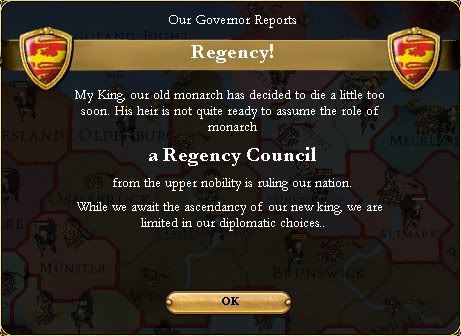
This turned out to be a blessing in disguise. Some bright minds were found for the council, and they came up with some important reforms in their short time leading the nation.
The first such reform was instituting a license requirement and an associated fee for liquor retailers. These licenses turned out to be a good source of income for Brunswick.
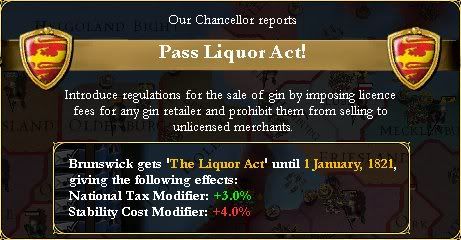
Meanwhile, the military experts of the council worked to hone both the army and the navy, and both areas saw small improvements in early 1468.
Work was also done in the cultural field. Council members corrected some leftover issues that had previously made the citizens of Paderborn feel like outsiders in the Brunswicker society.
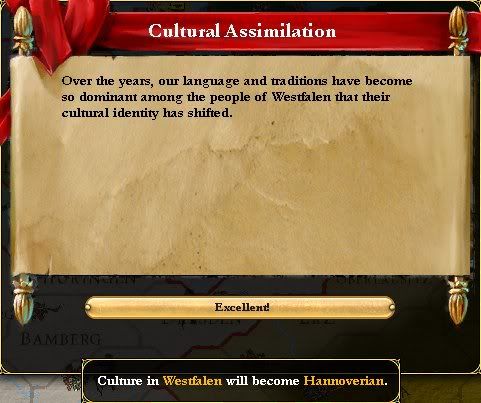
Finally, the privatization of some farmland near Bremen made that prosperous province even more efficient by October 1469.
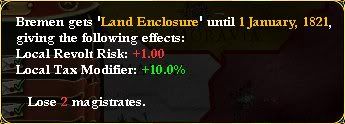
Some council members got a bit greedy however, suggesting that their success showed that rule by committee was a better option than the monarchy.

This idea made the heir furious, and he endeavored to assume power as soon as possible.
A skillful diplomat like his father but not a great monarch in other ways, he rose to the throne as Heinrich III on November 1st. It is not known why he chose to be the third when the previous Heinrich had been the first, but no-one questioned his decision.
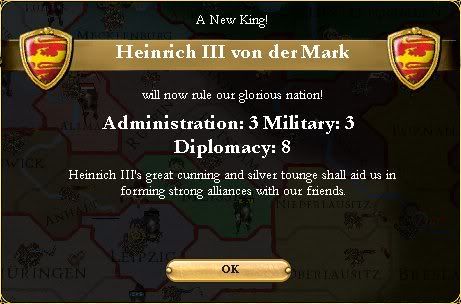
The situation in which Heinrich's reign started, however, meant that everything else about him was questioned. Considering the very successful council effort, would a republic form of government where one individual has less power be better? Can Heinrich, with his notable martial and administrative weaknesses, rise to the level of his influential father?
King Heinrich knew that he'd have to make his point quickly in order to appease everyone, and to accomplish that he used his strengths instead of dwelling on the weaknesses. Accused of being timid, he proved his critics wrong by entering discussions with Meissen in spite of express orders from the Bohemians not to do so, and in an impressive diplomatic victory secured Meissen's vassalization in January 1470, after barely two months of negotiations.
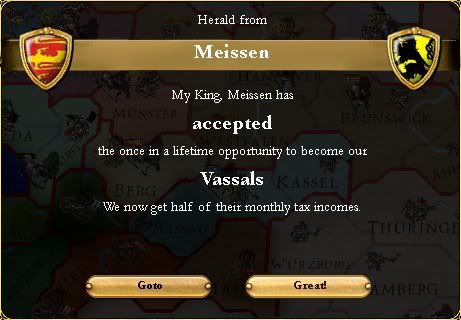
Heinrich III's demonstration of his expertise left everyone in awe. Any doubts that might have remained in some circles stayed well out of the public eye after such an important and quick accomplishment.
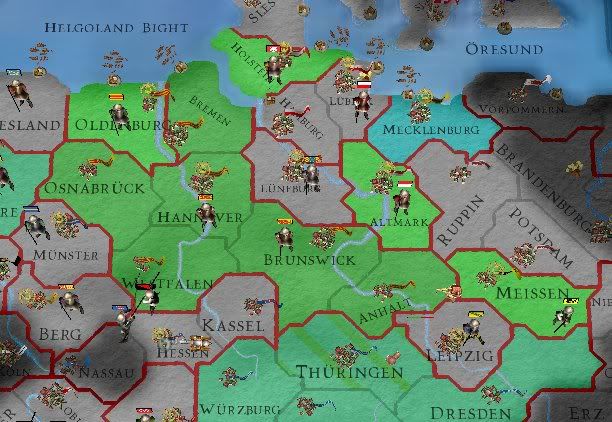
A noble republic would be a gentlemanly sort of thing to do. the rulers would be a very exclusive club. A core on Bavaria could prove useful. Meantime Heinrich III could do with a wife.
Wow, he certainly showed them. Now to see if his lack of skill in battle and domestically will come back to haunt him.
Maybe von der Marks are bored with the classic regnal numbers? IMHO it would greatly improve the prestige of the nation if the following Heinrich was Heinrich V and so on ...
...
I like how you RP to your king's stats.
Good to hear.
A noble republic would be a gentlemanly sort of thing to do. the rulers would be a very exclusive club. A core on Bavaria could prove useful. Meantime Heinrich III could do with a wife.
Noble republic is a real option. However, no way I'm going to switch when I have a DIP 8 ruler in a game where boundary disputes are the most important tool for expansion.
Yeah it's good to have that core. They're certainly too strong for me to take on now so it isn't a way to expand right now, but it could be very useful to have a permanent CB as that means that I can act if I see an opportunity to take them down.
Wow, he certainly showed them. Now to see if his lack of skill in battle and domestically will come back to haunt him.
Heh, it was neat enough to secure a diplovassalization two months into the reign.
Maybe von der Marks are bored with the classic regnal numbers? IMHO it would greatly improve the prestige of the nation if the following Heinrich was Heinrich V and so on...
Indeed, makes you seem all established.
It is not known why he chose to be the third when the previous Heinrich had been the first, but no-one questioned his decision.
Quite right too. Such questions would be impolite and entirely unbefitting of a gentleman! Good to see that even if Heinrich's command of numeracy is questionable, his silver tongued diplomatic ability is without doubt.
You could try a republic, no more regencies. Plus you can assume the role of liberator of poor peasants. No more on slave-master, but a bunch of them. 
henrich the can't count sure did well with the vassalization but we'll see what happens when turmoil roils the central european scene
Quite right too. Such questions would be impolite and entirely unbefitting of a gentleman! Good to see that even if Heinrich's command of numeracy is questionable, his silver tongued diplomatic ability is without doubt.
You're entirely right. Hmm, "command of numeracy", I suppose it would fit his ADM score if it was actually a matter of not knowing which number comes after one.
You could try a republic, no more regencies. Plus you can assume the role of liberator of poor peasants. No more on slave-master, but a bunch of them.
Hehe, well put. I do plan to switch to a republic at some point. However, as long as I have a DIP 8 ruler to fire those boundary disputes I'm certainly in no hurry to change.
henrich the can't count sure did well with the vassalization but we'll see what happens when turmoil roils the central european scene
Indeed. Things get a bit hairy in the end of the upcoming update...
Viva la Germany ?
That's one way to put it.
1470-1479: The Defeat of Friesland, and the Bavarian Question
In November, Brandenburg's diplomatic annexation of Pommerania posed a serious threat to Brunswick in the form of a stronger Brandenburg. Heinrich III reacted by declaring his protection of another small nation. Lüneburg wasn't interested in any negotiations with Brunswick - in fact, the nations had a pretty strained relationship - but Heinrich still let it be known that anyone meddling with his tiny neighbor would have to answer to him.

September 1471 saw the birth of Heinrich's son Friedrich Ulrich, the new heir to the Brunswick throne.
Meanwhile, the King continued building his diplomatic web. He started discussions with Saxony in the summer of 1472, and secured their vassalization in October.

There was at least one positive in the powerful Bavaria and Brandenburg - a lot of their smaller neighbors were looking for protection.
One nation that wasn't getting any from Brunswick was Holland. The little nation's despicable ruler had been excommunicated for his sins, so when Brunswick's ally Gelre declared war on the Dutch, Heinrich was happy to join the conflict.
The war was a short one, and as Brunswick's war efforts were hampered by particularist revolts after some reforms that reined in local authorities, Brunswick only took part in one battle where the extra men allowed Gelre to finish off Holland's army in Utrecht.
Soon after, in January 1473, Gelre forced the vassalization of Holland.

Heinrich III was not pleased with this outcome - his allies had allowed the sinful ruler to keep his throne.
However, any planned complaints were brushed aside when something more important came up. In early February some extensive smuggling operations were uncovered, and Heinrich spared no money or effort to end such crimes.

It was clear that his strengths lay elsewhere, as shown by his notable diplomatic achievements, but the King was worried about Brunswick's internal affairs: in a short period of time, there had been trouble with both smugglers and rebels. He decided that he had to make a strong statement, show that he wasn't a one trick pony only capable of handling foreign politics. So when more people protested in early 1474 about the recent reforms that moved power from the provinces to the capital, Heinrich III made a bold and successful proclamation that further strengthened the position of the King in Brunswick's political field.

The results were staggering. Not only did the proclamation bring long term effects, but it also made the King more popular than ever. A year later, budget reports showed that Brunswick's fortunes had been excellent in all financial sectors since the speech. The windfall was added to the nation's treasury.

Most of the success stories were, naturally, fleeting, but by April 1476 it was becoming apparent that the trade income stayed in those exceptional heights. It seemed that the merchant performance had improved for good thanks to the government reforms.

Gelre continued its aggressive behavior in September, this time against a target that Brunswick was more than happy to strike at: the hated Friesland! The Hansa joining on Friesland's side was only added incentive for Heinrich III to join his allies.
Brunswick again fought only one battle, routing a 4000 man army from Cologne, as the war lasted less than three months. Gelre annexed the vile Frisians in December - a deserved fate and one which Brunswick was happy to partially cause.

Afterwards, Heinrich continued with his reforms. Along with more conventional trade improvements, the formalized weights and measures system that was declared in May 1477 paid huge dividends in Brunswick's economic scene.

The King hadn't forgotten about his forte however, and the summer of 1478 saw him dealing with Münster. The small nation was included in the Brunswick sphere of influence, and despite the failure of any further efforts to mend relations with the country, more and more people over the next couple of months started believing that Münster, much like their former province Osnabrück, was effectively a part of Brunswick already.

Meanwhile, France was once again wreaking havoc. HRE Austria's dutiful attempt to protect member state Bar turned into a disaster as France not only annexed Bar, but broke Austria apart as well.

Also visible, in three separate parts, is the mess that is Hungary, save for the very eastern end.
To top it off, France annexed vassal Berry months later, and their King also became the King of Norway in a personal union next year.
At that point, however, Heinrich III didn't have time to worry about France, or Münster for that matter. In August 1479 the powerful Bohemia, along with allies Milan, Trier, Mecklenburg, Gotland and Kurland, attacked Brunswick's ally Bavaria.

Hungary jumped to Bavaria's defense with no second thoughts, but Brunswick now had a serious question to ponder: was it worth it to stay by the rogue nation's side? And was it even the right thing to do?
A difficult question. A gentleman stands by his allies. If you did not wish to come to Bavaria's aid, then the alliance should have been broken due to their actions. This is also a defensive war. In this case they are not the aggressors, but have been attacked. However, their hands are not clean.
A very prickly situation indeed.
A very prickly situation indeed.
Don't answer the alliance - declare a war of reconquest to make up for the prestige loss. Bavaria can hardly withstand a triple assault from Brunswick, Bohemia AND Milan.
Of course, this is ignoring honour, but the honourable thing would have been to not ally with such cads as Bavaria in the first place. Rectify Brunswick's past mistakes in a manner that will spare them from having to stoop to such depths in the future.
Of course, this is ignoring honour, but the honourable thing would have been to not ally with such cads as Bavaria in the first place. Rectify Brunswick's past mistakes in a manner that will spare them from having to stoop to such depths in the future.

